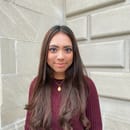Saki Yoshida (first-year), Yuko Yutaka (first-year), and Nanami Mezaki (sophomore) are international students from Japan studying at DePauw University. I interviewed them today to ask about culture shock they’ve experienced in the US, their overall experience as an international student, etc. The differences between being a first-year and being a sophomore international student, especially with the context of COVID-19, can be observed.
HerCampus: Where is your hometown? What do you like about it?
Saki Yoshida: I’m from Tokyo, Japan. I like Tokyo because of its convenience. I can go anywhere using trains and can buy food and other things anytime.
Yuko Yutaka: My hometown is Tokyo. Its convenience and accessibility to all sorts of activities is what I value most about the city.
Nanami Mezaki: My hometown is Hiroshima, Japan. Something I like about it is that there are two World Heritage Sites in Hiroshima! One is Itsukushima Shrine on Miyajima. It is a shrine built on top of water and has long been considered one of the three finest views in Japan. The other is the Atomic Bomb Dome. It is a symbol for the world’s prayers for peace and an end to nuclear weapons.
HC: What made you decide to study outside of Japan?
Yoshida: The diverse community of college [in the United States] was so attractive to me that I decided to study in the US.
Yutaka: Inspired by the studying abroad experience, I realized the benefit of liberal arts education and the opportunity to engage in a multicultural environment, which I haven’t seen much in Japan. Plus, though vague, I had a strong aspiration to get out of my comfort zone.
Mezaki: I decided to study in the US because of its college education system and its quality. In Japan, you need to decide your specific major before entering university. I do not think this is a good system because it is impossible for many people to decide what they want to do in life when they are still in high school and have never actually learned anything about their fields of interest. I felt like this would limit my opportunities and possibilities in the future. At DePauw, however, you get to choose your major in your sophomore year after you take some courses in fields that interest you. You have many options, such as double-majoring or creating your own major. This flexibility was definitely one of the biggest reasons I decided to study in the US.
HC: How long have you been in the United States?
Yoshida: I was born and raised in Virginia until the age of 6, and moved to Tokyo to receive an education there. I came back to the US at age 18 to study at DePauw.
Yutaka: I’ve been here since the beginning of this semester, and the other time being in the US was when I had my 10-month studying in Chicago.
Mezaki: I have been in the United States for a year and three months since I first came to DePauw. I went back to Japan for winter and summer break, though.
HC: Why did you choose to attend DePauw University in Indiana?
Yoshida: When choosing schools to apply to, I heard that there are many Japanese students at DePauw, so I thought it would be a secure place for me that I can ask for help easily.
Yutaka: I chose DePauw for three reasons: leadership education, supportive voice for creativity, and my Rector Scholarship.
Mezaki: Thanks to the Grew Bancroft Foundation in Japan, I am receiving a full tuition scholarship as a Grew-Rector Scholar for four years (the Grew-Rector scholarship program: every year, one Japanese student is awarded a full tuition merit scholarship to pursue their education at DePauw), which was the biggest reason I chose DePauw and how I got to know about it. DePauw is also famous for its high-quality liberal arts education. I always wanted a liberal education with small and discussion-based classes like DePauw offers.
HC: What are you studying?
Yoshida: I haven’t decided on a major yet, but I’m interested in anthropology and religious studies.
Yutaka: I haven’t declared my major yet, but I am thinking of philosophy as a top ideal major (I am always fascinated by thinking processes).
Mezaki: I am studying Physics and Computer Science, planning on doing a Pre-Engineering Program. I also enjoy taking Math and Economics courses.
HC: What is something that is very different in the US compared to Japan?
Yoshida: Everyone is speaking English here! And the food here is very different from Japan: it is sweeter and contains more oil, but I like it!
Yutaka: Everything is different. In terms of college, the class style is very much different; we have discussions, series of paper assignments, and the classroom air is kind of loose–– which is good because flexibility makes us more creative.
Mezaki: The US has a huge cultural, racial/ethnic, and religious diversity, which is beautiful!! I have learned so many things about diversity and inclusion since I came to the US, though I still have so much to learn.
HC: Did you experience any culture shock?
Yoshida: When I first saw people jogging half-naked, I was so surprised because it was a new culture for me! People in the US dress more freely than those in Japan.
Yutaka: I was culture-shocked when I saw the diversity of people. Looking back at my high school, I only knew one nationality in one distinct uniform. Other than that, I was surprised that there are places for discussion everywhere in the US, which I didn’t observe much in Japan. (Plus, it was shocking for the first time that people eat fries three times a day! But I got accustomed.)
Mezaki: Yes. People ask questions a lot in class. Some people call their professors by their first name. Basically everyone can dance (this might be a stereotype). There are many dietary options.
HC: What is something you miss about home?
Yoshida: What I miss the most is Japanese dishes such as sushi.
Yutaka: I don’t miss much about home as of now, but if I had to choose, I would say I miss my cat and family. Oh, I miss convenience stores, too.
Mezaki: My family and food in Japan. I wish Greencastle had some Japanese restaurants.
HC: Would you consider the United States your second home?
Yoshida: No, because I still often feel awkward or confused when I face the difference in the way of life between the US and Japan.
Yutaka: I wouldn’t consider the US my second home now because I don’t have a stable home to live in besides campus-owned housing. But, once I am settled, I think I will feel a lot like a second home.
Mezaki: Yes. I am so grateful for all the wonderful people I have met who make me want to say that I consider the United States my second home.
HC: What is your favorite thing about the United States?
Yoshida: I love sweets in the US! Candies and cakes are much sweeter than those of Japan, and that’s why I love them.
Yutaka: People smile a lot and talk a lot! That just makes my day, even though I consider myself an introvert. Plus, I love the food here to be honest.
Mezaki: My favorite thing about the United States is its friendliness and inclusive culture. American people charmingly greet not only their friends, but also strangers. They are good at communicating their feelings. In addition, people try to create an inclusive environment, holding each other accountable. I have met many great leaders who always make sure that everyone feels comfortable.
HC: Do you think DePauw does a good job supporting international students?
Yoshida: I think so. The most supportive thing I can think of is the English class EAP (English for Academic Purposes) workshops. They help me with improving my reading, writing, discussion skills, and also teach me about American culture.
Yutaka: I think they help us a lot, and the staff are all kind and supportive. I feel sorry that we came to DePauw in this pandemic season as we don’t really have the opportunity to go talk to them.
Mezaki: A big, huge yes. DePauw has a great international student community and both faculty and staff at DePauw really care about international students. When DePauw decided to shut down and transition to online learning due to COVID-19 last semester, and we all were panicked and did not know what to do, the amazing staff at International Student Services, including Yoanna and Loutfi, immediately held a Q&A session for international students and answered all the questions thoroughly. They continue to support us individually. Professors also make sure that international students can have the best learning experience like American students do, being mindful of our language barriers and cultural differences. I can feel that they all care about us and want us to succeed.



